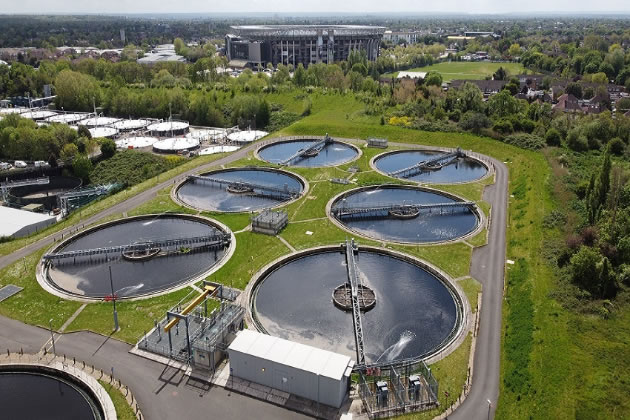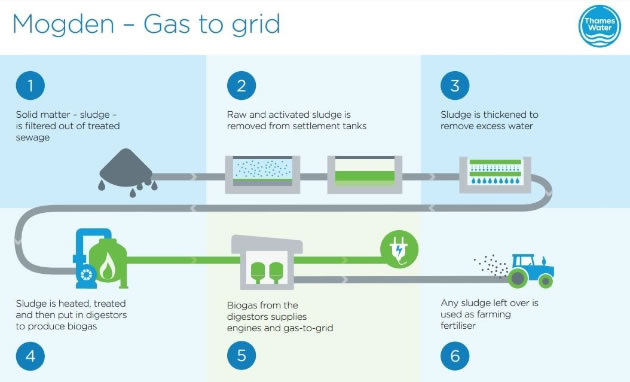Sewage from Mogden to Be Used to Heat Homes
Sludge to be converted into gas at the Isleworth treatment plant

An aerial view of the Mogden sewage works in Isleworth. Picture: Thames Water
|
January 23, 2024
Around 4,000 homes in west London will soon be heated using sewage sludge converted into gas, Thames Water has said.
The company has confirmed that a “gas-to-grid” system at its Mogden sewage works in Isleworth will start converting sewage into biomethane “early this year”.
The scheme is Thames Water’s second in London, having previously established a similar facility at Deephams sewage works in Edmonton.
Anna Boyle, the firm’s head of catchment at Mogden, said both projects had “set a remarkable example for environmental stewardship and innovation”.
Sewage sludge is a by-product of the sewage treatment process, which is then digested to produce biogas. This biogas is typically used to generate electricity, using Combined Heat and Power engines. The new facility will mean that a portion of the biogas is instead taken and filtered, so that it can be used as fuel for cooking and heating.
The scheme was welcomed by Hounslow Council’s cabinet member for climate, Katherine Dunne, who said it “will reduce carbon emissions from the [Mogden sewage] plant and is another positive step on Hounslow’s Pathway to Net Zero”.

A diagram showing how the gas-to-grid system at Mogden will work. Picture: Thames Water
The project was mentioned in September 2023 by Cathryn Ross – at that time, the company’s interim joint CEO – as one among many sustainability schemes Thames Water is pursuing.
She told the London Assembly’s environment committee that the company has also been investigating whether it can directly extract heat from sewage.
Ms Ross said, “We think that the effluent that we have within London alone could generate 10 terawatt hours of wastewater heat.
“To give you a feel for that, that’s the equivalent of 40 per cent of Hinkley [Point] C [nuclear power station]. That’s a tremendous, untapped resource.”
In addition, Thames Water has been looking at placing floating solar panels across 19 square kilometres of reservoirs within the M25, Ms Ross said.
Mogden is the UK’s third-largest sewage treatment works, serving more than two million people.
To improve London’s drought resilience, Thames Water has put forward proposals to create a new river abstraction site on the Thames at Teddington Weir – but the plans have proved controversial.
A petition opposing the scheme on environmental grounds has received almost 30,000 signatures, but Thames Water has said the project poses “a low risk to the environment, and the risks can be mitigated”.
The scheme would involve water being removed from the Thames at Teddington and transferred via an existing underground tunnel to the Lee Valley reservoirs in east London.
Thames Water says that “highly treated recycled water” would then be moved from Mogden to Teddington, to compensate for the water taken from the river.
Opponents of the scheme are concerned about the impact on river life, fish, insects and plants, because it will change the water temperature and its chemical make-up.
Thames Water says it is “continuing to carry out more detailed assessments in consultation with the Environment Agency, Natural England, the Drinking Water Inspectorate and other stakeholders”.
They add, “We’ll share this work with the local community when it’s ready and ensure there is sufficient opportunity for consultation and engagement on the outcomes of assessments and as the project is developed.”
Noah Vickers - Local Democracy Reporter
Like Reading Articles Like This? Help Us Produce More This site remains committed to providing local community news and public interest journalism. Articles such as the one above are integral to what we do. We aim to feature as much as possible on local societies, charities based in the area, fundraising efforts by residents, community-based initiatives and even helping people find missing pets. We’ve always done that and won’t be changing, in fact we’d like to do more. However, the readership that these stories generates is often below that needed to cover the cost of producing them. Our financial resources are limited and the local media environment is intensely competitive so there is a constraint on what we can do. We are therefore asking our readers to consider offering financial support to these efforts. Any money given will help support community and public interest news and the expansion of our coverage in this area. A suggested monthly payment is £8 but we would be grateful for any amount for instance if you think this site offers the equivalent value of a subscription to a daily printed newspaper you may wish to consider £20 per month. If neither of these amounts is suitable for you then contact info@neighbournet.com and we can set up an alternative. All payments are made through a secure web site. One-off donations are also appreciated. Choose The Amount You Wish To Contribute. If you do support us in this way we’d be interested to hear what kind of articles you would like to see more of on the site – send your suggestions to the editor. For businesses we offer the chance to be a corporate sponsor of community content on the site. For £30 plus VAT per month you will be the designated sponsor of at least one article a month with your logo appearing if supplied. If there is a specific community group or initiative you’d like to support we can make sure your sponsorship is featured on related content for a one off payment of £50 plus VAT. All payments are made through a secure web site. |